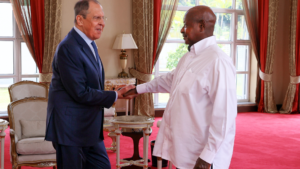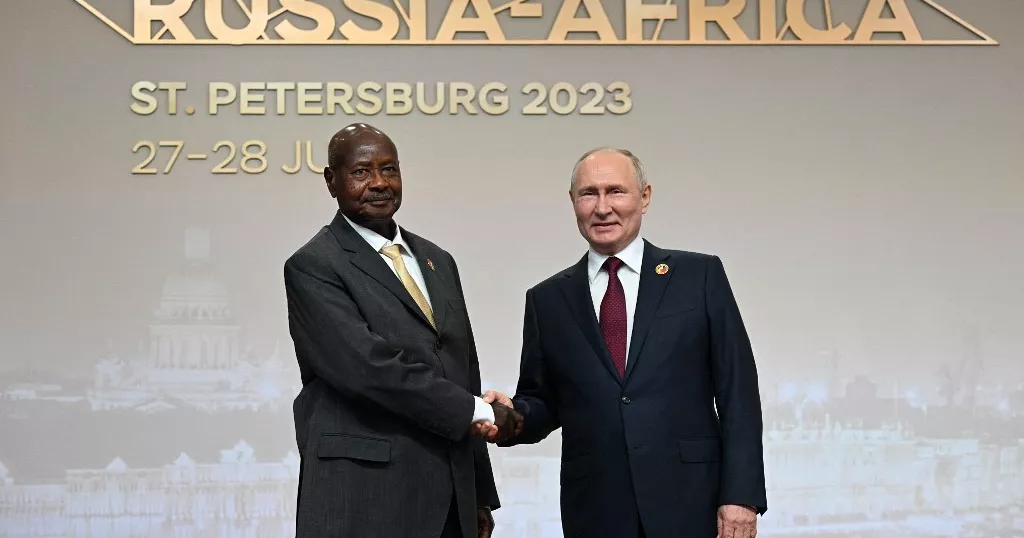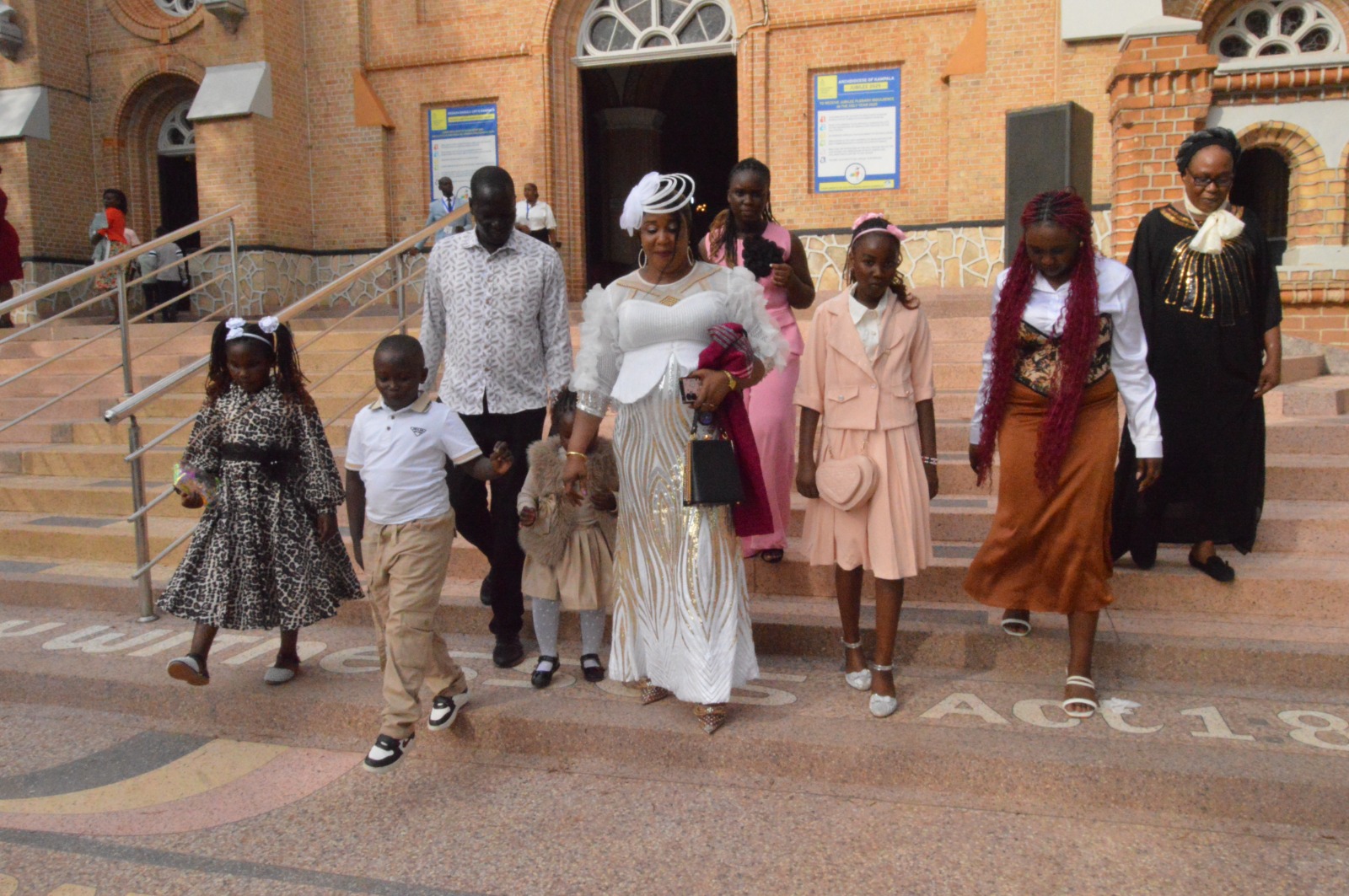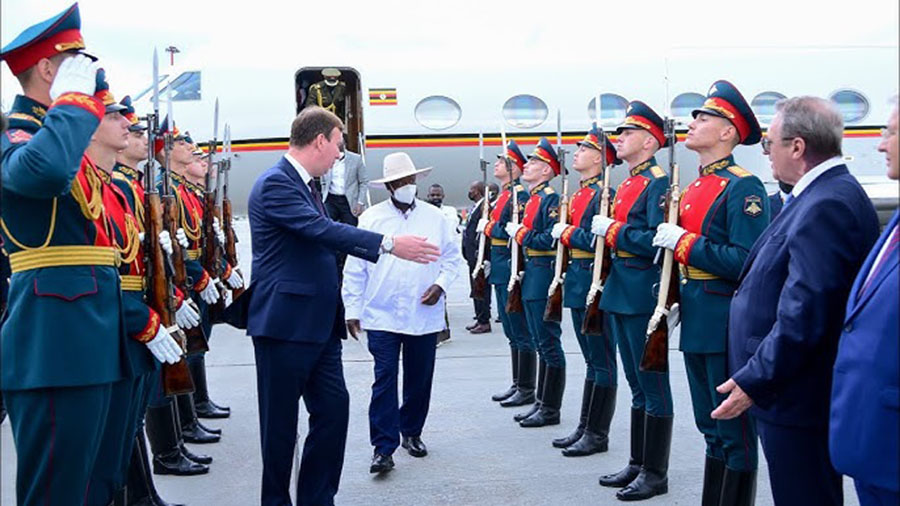Duncan Abigaba, a young political activist and supporter of the National Resistance Movement (NRM) does not hide his love for Russia.
“I like Russia,” he told Bbeg Media in an interview. “ I love the fact that it has managed to develop and grow economically in spite amidst so many challenges.”
Because of continually praising Russia on his social media platforms, Abigaba has been labelled an agent of Russia’s propaganda in Uganda, by some people.
It is a description he detests.
“The fact that I went and studied in Russia does not make me its propagandist. I have also been to fellowships in the USA. Does that mean I am its agent?” he queried.
Over the past three years, Russia has significantly deepened its relationship with Uganda, leveraging economic, military, and social ties to expand its influence in East Africa.
This strategic pivot has coincided with Moscow’s increasing isolation from the West following its invasion of Ukraine in February 2022. As Western nations imposed sanctions and scaled back engagement with Russia, the Kremlin has turned to African nations like Uganda to bolster its geopolitical standing, counter Western dominance, and advance its agenda.
Abigaba does not see anything wrong with this. He says Uganda and Russia have enjoyed historical ties since the 1960s and that there is not much to read about the recent strengthening of ties between Moscow and Kampala.
“Since the 1960s, Russia and Uganda have been close. Russia firms constructed many iconic infrstaructral projects, trained our engineers and did many other good things. So in a way Russia has always been close to Uganda,” he says.
Yet some say the tightening of ties has the potential to undermine Uganda’s democratic progress, since Moscow’s authoritarian model appeals to President Museveni.
Economic Ties
Over the last seven years, the economic relationship between Russia and Uganda has seen notable growth, particularly in trade and investment.
According to data from the Russian Federal Customs Service (RFCS), trade turnover between the two nations has increased significantly. In 2021, Uganda exported $18.1 million worth of goods to Russia, while Russia exported $90.2 million to Uganda, reflecting a trade imbalance favoring Moscow.
Between 2013 and 2020, Uganda primarily imported cereals from Russia, with annual values ranging from $30 million to $90 million. By 2018, bilateral trade had doubled from $30 million in 2009 to over $74 million, with significant Russian investments in Uganda’s mining and information and communication technology (ICT) sectors.
In 2023, during the Russia-Africa Summit in St. Petersburg, President Vladimir Putin noted that trade between Russia and Uganda had increased fivefold in the first half of the year compared to the previous year.
In 2019, Uganda signed an Inter-Governmental Agreement (IGA) with Russia’s state corporation ROSATOM to develop nuclear technology for energy, medical, and agricultural purposes. This agreement aims to exploit Uganda’s uranium deposits to boost energy production.
Some analysts say these economic engagements are part of Russia’s broader strategy to create a multipolar world order, bypassing Western sanctions by fostering partnerships with African nations like Uganda
Military Cooperation
Russia’s military engagement with Uganda has been a cornerstone of their bilateral relationship, particularly over the past three years.
Uganda has long relied on Russian military equipment, including T-72 and PT-76 tanks, BTR-60 armored personnel carriers, MiG-21 fighters, and more recently, T-90S tanks and Su-30MK2 fighters.
In 2023, Uganda purchased new Mi-28 attack helicopters from Russia, and in January 2024, President Museveni commissioned a helicopter maintenance, repair, and overhaul (MRO) facility at Nakasongola Air Base. This facility, the only one of its kind south of the Sahara, is designed to service Russian-made Mi-24 helicopters for Uganda and neighboring countries, positioning Uganda as a regional hub for Russian military technology.
A significant milestone came in August 2024, when Russia donated $100 million to the Uganda People’s Defence Forces (UPDF). This is roughly 10% of Uganda’s defence budget. The donation followed discussions at the 2023 Russia-Africa Summit, where Uganda pledged to establish itself as a regional hub for maintaining Russian military equipment and producing modern small arms.
The Chief of Defence Forces Gen Muhoozi Kainerugaba has been a key figure in Uganda’s political landscape, has been instrumental in fostering these ties.
Muhoozi’s public admiration for Putin, including his controversial offer in 2023 to send Ugandan troops to support Russia in Ukraine, is a clear indication that the military ties between between Kampala and Moscow are deep.
Political Influence
Russia’s influence in Uganda extends beyond economic and military spheres into the social and political realms, where it has employed propaganda to shape public opinion and counter Western narratives.
Since March 2022, the Uganda Broadcasting Corporation (UBC), has aired four hours of Russia Today (RT) daily.
Some say this arrangement, which began shortly after Russia’s invasion of Ukraine, allows Moscow to disseminate its perspective directly to Ugandan audiences, framing Russia as a reliable partner and the West as a neocolonial adversary.
Secondly, in June 2022, the National Resistance Movement (NRM) signed a cooperation agreement with Russia’s ruling United Russia party, further aligning the two governments politically.
Abigaba says this agreement was aimed providing mentorship to NRM leaders just like the ruling party has similar arrangements with the Communist Party of China.
This agreement coincided with a visit by Russian Foreign Minister Sergei Lavrov to Kampala in July 2022, during which Museveni praised Russia’s historical support for Africa’s anti-colonial struggles.

There are also indications of Russian ideological influence in Uganda’s domestic policies, particularly regarding the controversial Anti-Homosexuality Act (AHA) passed in 2023. While direct evidence of Russian involvement in the legislation is inconclusive, the timing of increased Russian engagement—Lavrov’s visit, the NRM-United Russia agreement, and pro-Russia statements by Ugandan officials—overlaps with the rapid push for the AHA.
Some reports speculate that Russia may have supported the AHA to exploit anti-LBGTQ sentiment, a tactic it has used elsewhere to advance its geopolitical goals by aligning with conservative religious groups.
Senior government officials have consistently expressed admiration for Russia, reinforcing the narrative of a strong and mutually beneficial partnership.
In 2023, President Museveni, in an interview with TASS, the Russian news agency said he was drawn to Russia because it does not meddle in internal affairs of other countries.
“Russia has been supporting the anti-colonial African movement for the last 100 years and I commend their long-standing relationship with Uganda,” he said.
His son, Gen Muhoozi, has been more vocal.
In a September 2022 tweet, he said: “Any attack on Russia is an attack on Africa.”
Whichever way you look at it, there is no denying that Russia’s increased engagement with Uganda over the past couple of years reflects a calculated effort to expand its influence in Africa amid Western isolation. The fear by some is that this relationship in the long run will undermine Uganda’s democratic progress. How?
(Watch out for the second part)





